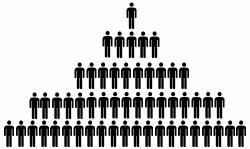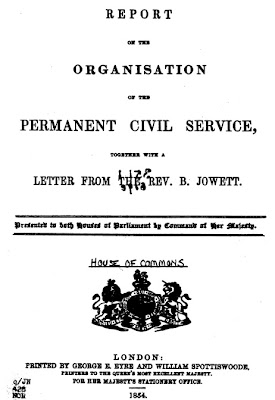by Malcolm Richardson and Andrew Roberts
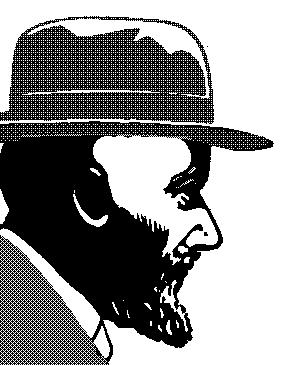
|
MAX WEBER
German
political economist who became a founder of what we
call
sociology
Born
1864, Died
1920.
Weber as a political economist
At
Heidelberg University,
Weber was a student of
Karl Knies, who wrote
"The economic life of a people is so closely interwoven with other areas of
its life that any particular observation can only be made if one keeps in
view its relation with the whole."
|
The sociology of Weber
Max Weber wrote in the tradition that treats society as
something created by individuals, rather than as something that is
real.
A key concept for this approach is
social action and,
because action is defined by its meaning, the approach has been called
interpretive
sociology (Although many other terms are used)
Weber wrote in Germany at a time when a strong academic culture argued that
the natural and social sciences are radically different. See, for example,
the work of
Wilhelm Dilthey. In the modern world, on of the most outspoken
supporters of Dilthey's
"Hermeneutics" is
Zygmunt Bauman
|
Weber's life and works
Born in Germany before it was one country
21.4.1864
Born into a German middle-class family. His family was a lawyer
and they soon moved to Berlin, the capital of Prussia.
The war
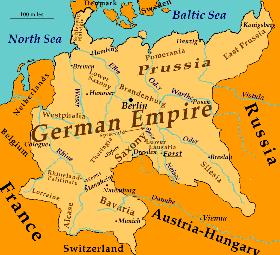
|
1870-1871 Prussia defeated France in a war of expansion. Followed by
the unification of Germany in which Berlin became the capital of the new
German Empire.
"Sociologically", Weber
later argued
said later, the modern state can only be defined
"in terms of the specific means peculiar to it... namely the use of
political force"
|
The struggle over culture
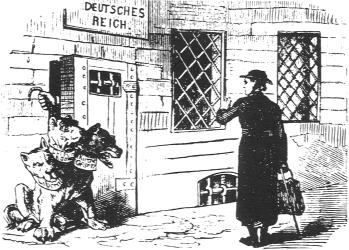
The three headed hell dog is set on the catholic priest
|
From 1871: Kulturkampf The battle over culture between the
Germany and the Catholic Church.
Prussian "Falk Laws" of May 1873
completely subordinated the church to
state regimentation.
|
Weber
later argued that although force is essential to the modern
state, it
is not its "normal or ... only means". The state had to engage in a
struggle over culture: over what its citizens believed about it
"If the state is to exist, the
dominated must obey the authority claimed by the powers that be. When and
why do men obey? Upon what inner justifications ... does this domination
rest?"
Studied law
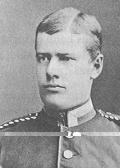
In army uniform 1884
|
1882
Weber a law student at
Heidelberg University. He studied law in a broad
social sense that included classes in economics, history, philosophy, and
theology.
About this time he also served in the army. Later he practised
law in Berlin. In 1892 he prepared for Privatdozent
(lecturer) status in Roman, German and commercial law at
Berlin. In 1893 [Aged 29] he married Marianne Schnitger, who
became a leading German feminist. Until he married he lived
with his parents.
|
Studied economics
1892
Researching the
condition of workers in large-scale capitalist agriculture
stimulated interest in development of modern capitalism.
1894 Professor of Economics at
Freiburg University.
1895:
Inaugural address on The
National
State and Economic Policy - "The brutality of
my views have caused horror:"
"There can be no peace in the economic struggle for existence..
It is not for us to show our successors the way to peace and human
contentment, but rather to show them the eternal struggle for the
maintenance and cultivation of our national integrity."
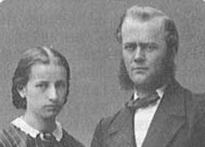
Weber's mother and father
|
1897 Weber's father's death followed by Weber's mental breakdown.
He was granted indefinite leave of absence from the University.
It was the period after his
breakdown which produced Weberian Sociology.
|
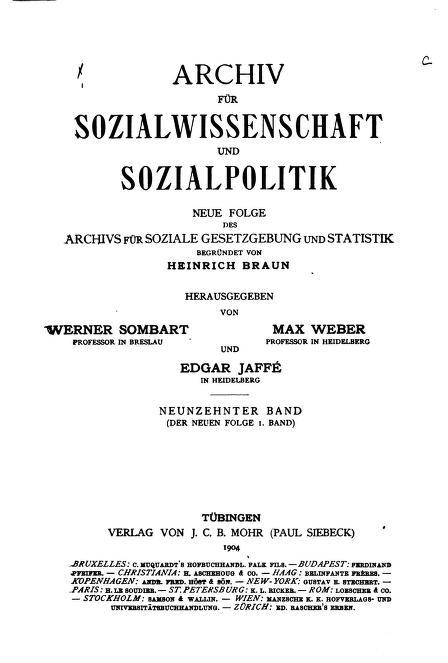
|
Much of Weber's sociology was produced as an editor and contributor to the
Archives for Social Science and Social Welfare,
It was in this that his best known work was published in 1904 and 1905.
|
1904:
Most well-known work,
Protestant Ethic and the Spirit of Capitalism
1914-1919
First World War
14.6.1920 Died of pneumonia
Some of his works:
 Recommended starters Recommended starters
"The Social Reasons for
the Decline of Ancient Culture"
 The Protestant Ethic and the Spirit of Capitalism
The Protestant Ethic and the Spirit of Capitalism
The Theory of Social and Economic Organisation [Includes The
City]
The Economic Ethics of
World Religions
 Politics as a Vocation
Politics as a Vocation
 Science as a Vocation
Science as a Vocation
The Rational and Social Foundations of Music
Collected Essays on the Sociology of Religion
Ancient Judaism
The Religion of China: Confucianism and Taoism
The Religion of India: The Sociology of Hinduism and Buddhism
General Economic History
Methodology of the Social Sciences
Weber studied
power and
domination. To understand how human beings dominate
one another in society he argued that we need to understand more than
force
(politics) and
production
(economics) we also have to understand
culture.
Culture' refers to all those things which individuals find meaningful and
significant, and which are related to their ideas, values and beliefs. He
said that The Protestant Ethic and the Spirit of Capitalism was
"a contribution to the understanding of the manner in which
ideas become an effective force in history... we are ... attempting to
clarify the part which religious forces have played in forming the
developing web of our specifically worldly modern culture" (p.90)
To understand why people act in certain ways, means understanding what
motivates their actions

|
Usually, we can understand what people are doing
by direct observation. In the picture we can see people are chopping wood.
But why are they chopping wood? To understand whay they are so acting, we
have to interpreting (make sense of) their actions in a wider context of
meaning
[See below]
|
Weber
wrote that
"Sociology is a science which attempts the interpretive
understanding of social action in order thereby to arrive at a causal
explanation of its course and effects.
In action is included all human behaviour when and in so far as the acting
individual attaches a subjective meaning to it. Action in this sense may be
either overt or purely inward or subjective; it may consist of positive
intervention in a situation, or of deliberately refraining from such
intervention or passively acquiescing in the situation.
Action is social in so far as, by virtue of the subjective meaning attached
to it by the acting individual (or individuals), it takes account of the
behaviour of others and is thereby orientated in its course"
Weber operates with what he calls "ideal types". These are sociological
concepts constructed to analyse the social world. The ideal types exist as
concepts. The real world is much more complicated.
In the The Protestant Ethic and the Spirit of Capitalism, Weber
speaks of the
"ideal type of the capitalist entrepreneur... He avoids
ostentation and unnecessary expenditure..." (p.71)
He does this to contrast with some actual (real) businessmen in Germany who
tried to "cover up their social origin" by living like aristocrats. The
ideal type helps one to analyse the actual social reality.
In
another book he says
"sociological analysis both abstracts from reality and at the
same time helps us to understand it...
the same historical phenomenon may be in one aspect
"feudal," in another
"patrimonial," in another
"bureaucratic," and in still another
"charismatic." In order to give a precise meaning to these
terms, it is
necessary for the sociologist to formulate pure ideal types of the
corresponding forms of action which in each case involve the highest
possible degree of logical integration... "
Sociologists develop 'ideal models' of reality or ideal-types. This is done
by selecting out and emphasising the most significant features, and
ignoring the rest.
Weber's concept of
modern rational capitalism is based on ideal
types of what rationality is. In the
introduction to The Protestant Ethic and the Spirit of
Capitalism, Weber argues that we need to identify the type of
rationality specific to western capitalism because
"rationalizations of the most varied character have existed in
various departments of life and in all areas of culture."
"here is, for example, rationalization of mystical
contemplation, that is of an attitude which, viewed from other departments
of life, is specifically irrational, just as much as there are
rationalizations of economic life, of technique, of scientific research, of
military training, of law and administration. Furthermore, each one of
these fields may be rationalized in terms of very different ultimate values
and ends, and what is rational from one point of view may well be
irrational from another"
To analyse this complex reality, Weber creates four ideal types of social
action. Just two of these are rational. The other two are non-rational
types. The four are:
Rational in pursuit of a goal
-
value-
related conduct -
affectual, especially emotional -
traditional
Ideal types of social action: Rational Instrumental
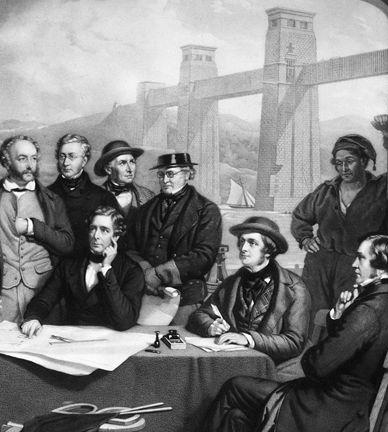
|
Instrumentally-rational action. Choosing most effective means to secure
desired objective. For example: cutting costs in order to boost company
profits.
Raymond Aron suggests that Rational action in relation to a
goal is the action of the engineer who is building a bridge,
the speculator at the stock exchange who is trying to make money, the
general who wants to win a victory.
|
Ideal type of social action: Rational Value
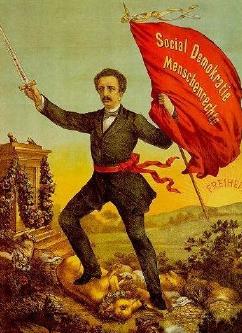
|
28.8.1864 The founder of the General German Workers'
Association
(Allgemeiner Deutscher Arbeiterverein), Ferdinand Lassalle fought, a
duel in Switzerland over his love for Helene von Donniges. He had no hope
of reclaiming her, but fought it to defend his honour as a jew, a socialist
and a lover. He was wounded, and died on 31.8.1864. He is buried in Poland.
Raymond Aron says
"the action is rational, not because it seeks to attain a
definite and external goal, but because" Lassalle sought "to remain
faithful to his own idea of honour".
|
Ideal type of social action: Affectual
Ideal type of social action: Traditional
Traditional action. Performed because of custom and tradition, e.g state
ceremonies, as in this photograph where an army band marches past the
German Emperor
Wilhelm 2nd in Weber's time.
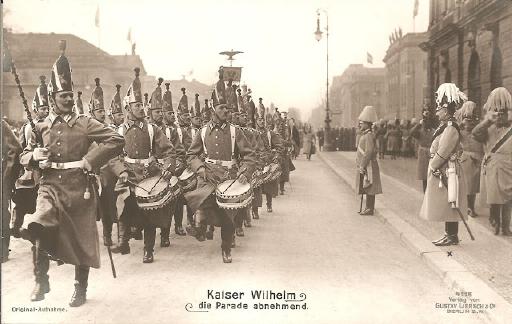
Interpretative Understanding
(Verstehen)
Interpretative Understanding. To understand something is to interpret its
meaning correctly, like a word in a sentence. Two types:
(1) Direct Observational (Descriptive) Understanding - understanding what
someone is doing, e.g.
woodcutter chopping wood by direct observation.
However, observation cannot necessarily tell us why they are doing it.
Hence, we also need:
(2). Explanatory Understanding - making sense of an action by placing it in
a wider context of meaning.
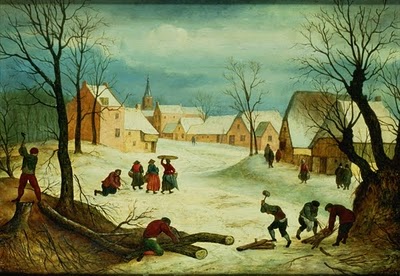 Abel Grimmer
(1570-1619)
Abel Grimmer
(1570-1619)
Winter Landscape with Peasants Chopping
Wood
|
To understand why the woodcutter is cutting
wood we need to consider it as part of a wider sequence of meaningful
events. Are they chopping wood to earn a wage, to light a fire to keep
warm, or for physical exercise?
|
Interpretative Sociology: Is it Scientific?
"the nature of the relationship of scientific work and its
presuppositions varies widely according to their structure. The natural
sciences, for instance, physics, chemistry, and astronomy, presuppose as
self-evident that it is worth while to know the ultimate laws of cosmic
events as far as science can construe them."
(Weber 1919Science)
Weber argues that unlike physical objects, human beings are endowed with
reason and consciousness, feelings and emotions, will and intention.
Explanations of human behaviour have to take account of subjective states
of mind. Individuals often respond to the same or similar circumstances in
very different ways - which general laws cannot accurately predict,
precisely because they are general.
Interpretative sociology is not a precise science.
Human behaviour is not like the behaviour of physical objects which can be
accurately predicted by the laws of physics.
Human actions are governed by ideas, values and
beliefs.
Sociological inquiry therefore must use different methods to say
physics, which relies upon observation and experiment.
The aim is an
interpretation of human behaviour which is the most probable in the light
of the evidence (including statistical and other data).
We can inquire into
people's motives and intentions, through surveys etc., but we can never be
certain the answers they give are truthful, or unambiguous. In many
instances, such as historical studies, it is not possible to conduct
surveys, and we have to rely on other types of evidence.
This does not mean
that one interpretation is as good as another. Evidence is crucial. The
more evidence, and the more varied the evidence supporting a particular
interpretation, the more scientifically plausible it is likely to be.
The Protestant Ethic and the Spirit (Geist) of Capitalism

|
The Capitalist Spirit (Geist)
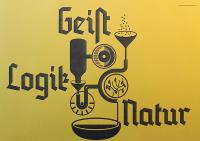 itf grafik design
itf grafik design
|
Hegel argued that mind (geist) operates through logic on nature (the
material world).
Geist can be translated spirit or mind. Weber wrote about "der Geist des
Kapitalismus" (the spirit of capitalism)
|
Weber considers the influence of culture on material production. To what
extent can a mind-set be considered the driving force of capitalism?
The zeitgeist (time spirit) that
Hegel, Saint Simon and John Stuart Mill studied is usually translated
"Spirit of the Age"
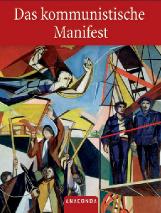 picture
picture
|
The spectre of communism that
Marx and Engels said was haunting Europe's rulers in 1848 was
not a Geist but a Gespenst (ghost).
Marx and Engels thought the ghost had
material foundations in the rising working class. So Marx and Engels were
offering materialism as an alternative to Hegel's idealism.
Without denying the material foundations of social reality, Weber considers
how Geist (mind/spirit) might have an independent influence on economic
development.
|
The Catholic Church and the Protestants
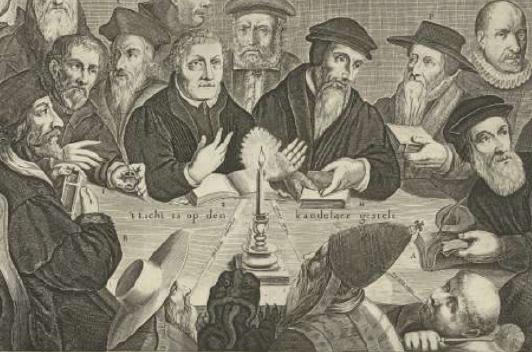
This anonymous Dutch engraving
(1640-1684), published by Hugo Allard,
includes the words Het licht is op de kandelaar gestelt
[Perspectives on the light
from the candle]. It is an anti-Catholic
cartoon showing protestants, led by
Martin Luther (Germany) and John Calvin
(Switzerland), sitting at the back and sides of a table on which a candle
burns brightly from a candlesick placed on the Christian
Gospel (Bible).
At the front of the table, the devil, the Pope, a cardinal and a monk try
desperately, but unsuccesfully to blow out the candle. See
Rijksmuseum online catalogue
|
"A glance at the occupational statistics of any country of
mixed religious
composition brings to light with remarkable frequency ... the fact that
business leaders and owners of capital, as well as the higher grades of
skilled labour, and even more the higher technically and commercially
trained personnel of modern enterprises, are overwhelmingly Protestant.
...
The same thing is shown in the figures of religious affiliation almost
wherever capitalism, at the time of its great expansion, has had a free
hand to alter the social distribution of the population in accordance with
its needs, and to determine its occupational structure. The more freedom it
has had, the more clearly is the effect shown.
...
A number of those sections of
the old Empire which were most highly developed economically and most
favoured by natural resources and situation, in particular a majority of
the wealthy towns, went over to Protestantism in the
sixteenth
century
...
There arises thus the historical question: why were the districts
of highest economic development at the same time particularly favourable to
a revolution in the Church? The answer is by no means so simple as one
might think."
|
Modern Rational Capitalism
Weber argues that modem rational capitalism is a unique feature of
'Western' historical development (i.e. Western Europe and North America).
It's key features are:
(i) economic activity which is oriented exclusively to the market,
(ii) the use of double-entry (income vs expenditure) bookkeeping for the
precise calculation of profit and loss,
(iii) the systematic pursuit of profit by lawful means,
(iv) the employment of wage-labour on freely negotiated terms and
conditions.
Benjamin Franklin quotes exemplify the (secular) spirit of
Capitalism

|
Benjamin Franklin was not a great capitalist. He made a small
fortune from
popular printing and publishing in the British American colony of
Philadelphia.
The
quotations Weber made
from him are from obscure writings. Franklin's best know
writings a
scientific ones on electricity and lightning.
Nevertheless, Weber argues,
they
exemplify the spirit of capitalism. Weber uses these quotations as what he
later calls an "ideal type"
|
In
1748, Franklin wrote a letter "To my friend A.B." containing
"Advice to a Young Tradesman" from "An Old Tradesman". Here are some of the
points he made:
"1. Remember, that time is money. "The person who can earn ten
shillings a
day by their labour, but who works only half a day has thrown away five
shillings";
2. Work diligently. "The sound of your hammer", heard by your creditors
early in the morning and late at night, makes them go easy on you for
another six months. But, if they see you idling when you should be at work,
they will demand their money back the very next day;
3. Be prudent in your financial affairs. "Beware of thinking that
everything you possess is belongs to you, and live accordingly. It is a
mistake that many people who have credit fall into. Keep an exact account
of income and expenditure, and you will soon see how what may appear as
trifling expenses soon mount up to large sums, and put your credit
worthiness in jeopardy."
Weber argues that the ethic contained in Franklin's writing s of earning
more and more money, but strictly avoiding all
spontaneous enjoyment of life.
"Man is
dominated by the making of money, by acquisition as the ultimate
purpose of his life. Economic acquisition is no longer subordinated
to man as the means for the satisfaction of his material
needs."
"The
earning of money within the modern economic order is, so long
as it is done legally, the result and the expression of virtue and
proficiency in a calling; and this virtue and proficiency are, as it
is now not difficult to see, the real Alpha and Omega of Franklin's
ethic, as expressed in the passages we have quoted, as well
as in all his works without exception."
The secular spirit of capitalism has a religious origin

|
The capitalist spirit has a religious origin in the ethical doctrines of 16
century Protestantism, and specifically Calvinism (after the 16 century
Swiss theologian
John Calvin).
Calvin taught that whether you go to heaven or hell after death is a free
gift of God - It is a result of divine "grace", not something you earn by
good deeds
This led to a calvinist belief in predestination: No individual
knows their fate in
afterlife (heaven or hell). It is pre-ordained by God, and only known to
God.
|
Weber argues that those Protestants who accepted the idea of predestination
would have suffered acute psychological anxiety -
'salvation anxiety' - from not knowing their fate in the afterlife. The
only way to cope was to behave in a 'Christian manner', doing good and
living a simple, hard working life, in belief these would be tangible signs
that one would enter heaven.
Calvinism demanded rigorous discipline in everyday 'conduct. Any slip, any
lapse in behaviour could not be redeemed, and was a sign of eternal
damnation. The pressure to be highly disciplined and righteous was intense,
including in one's business or occupation. This was the essence of the
Protestant ethic - and its affinity with the 'capitalist spirit'.
By endowing economic activity, with religious meaning and significance,
Calvinism assisted the development of capitalism . Idleness and pleasure
were sins, but not the pursuit of profit. Austere lifestyle and the
continuous accumulation of wealth, acted as a powerful lever for the
development of modern capitalism.
Modern Capitalism
Once securely established modern capitalism abandons its religious roots.
It is now a 'way of life'. We are born into this 'culture', and its
'rational', competitive spirit shapes our everyday activities.
"The capitalist economy of today is an immense cosmos into which the
individual is born, and which presents itself to him... as an unalterable
order of things in which he must live. It forces the individual, insofar as
he is involved in the system of market relationships, to conform to
capitalist rules of action. The manufacturer who in the long run acts
counter to these norms, will just as inevitably be eliminated from the
economic scene as the worker who cannot or will not adapt himself to them
will be thrown into the streets without a job. Thus the Capitalism of
today, which has come to dominate economic life, educates and selects the
economic subjects it needs through a process of economic survival of the
fittest. Victorious capitalism, since it rests on mechanical foundations,
needs (religious) support no longer.. . the idea of a duty in one's calling
prowls the ghost of dead religious beliefs.. The Puritan wanted to work in
a calling: we are forced to do so" (Weber, The Protestant Ethic etc., pp.
54-5; pp 181-2).
We come now to some of the
tools that Weber created to help us analyse politics and
government.
Writing about
"types of order in corporate groups",
Weber
distinguishes (in German) between Macht and
Herrschaft and legitime Herrschaft: -
which I will translate as Power and Rule and Legitimate rule
Herrschaft has also been translated as Domination. Legitime
Herrschaft can be translated as authority.
Weber defines power (Macht) as
"the probability that one actor within a
social relationship will be in a position to carry out his own will despite
resistance, regardless of the basis on which this probability rests."
This is a very general concept, and Weber says
"The concept of power is highly comprehensive from the point of
view of sociology. All conceivable qualities of a person and all
conceivable combinations of circumstances may put him in a position to
impose his will in a given situation"

|
The power of glamour:
This lady has the power to attract attention
|
To analyse order in groups we clearly need a more specific concept.
Weber
selects three:
Herrschaft [Rule or domination], which he defines as "the
probability that a command with a given specific content will be obeyed by
a given group of persons".
Disziplin [Discipline]: "the probability that by virtue of
habituation a command will receive prompt and automatic obedience in
stereotyped forms, on the part of a given group of persons."
Authority or Legitimate rule: A corporate group, whose
members, by virtue of their membership, are subjected to the legitimate
exercise of rule (authority) is called an Herrschaftsverband or
association of the rule. Or, to put it another way, groups are governed by
different kinds of rules.
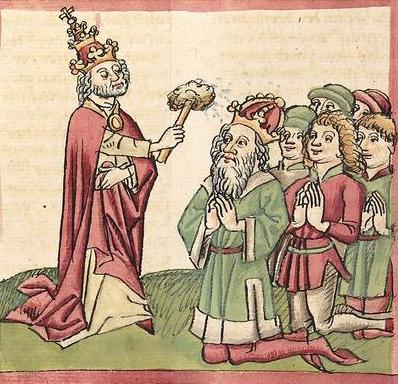
|
The power of the church:
This man has the power and authority to subordinate the group
|
|
Weber creates three ideal types of legitimate rule:
Traditional Domination: command based on claim that people should
obey
because this is what people have always done - For example
'Black Rod' summoning
MP's to listen to the Monarch's speech in the House of Lords.
Charismatic Domination: command based on claim that people should
obey
because their lives will be transformed. Obeyed because they are believed
to possess extraordinary qualities: divine, superhuman, or supernatural
powers -
For example, the power exercised by
Prophet Muhammad,
Mahatma Gandhi, or
Martin Luther King.
|
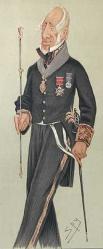
|
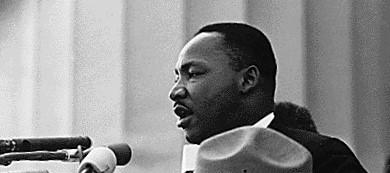
|
28.8.1963 I have a dream that my four little children
will one day live in a nation
where they will not be judged by the colour of their skin but by the
content of their character.
|
Or Jesse Jackson
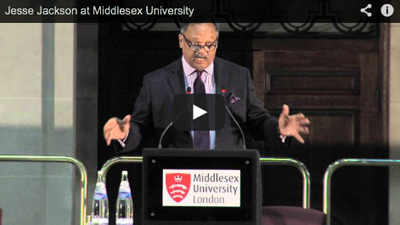
Ideal type of Bureaucracy
1. A Functional Division of labour
Various functions of the organisation
divided between different offices, departments, and staff.
"The regular activities
required for the purposes of the bureaucratically governed structure are
distributed in a fixed way as official duties".
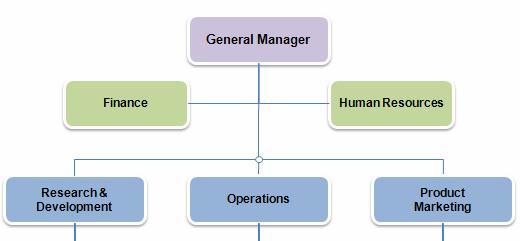
Private and public organisations could be organised like this. Private
organisations included factories and businesses. Public organisations
included the Civil Service.
But you could also imagine the whole of society as a functional
organisation. This is what George Cruikshank did in 1840 when he made the
first sketch for this picture of Britain as a beehive with everyone serving
a function.
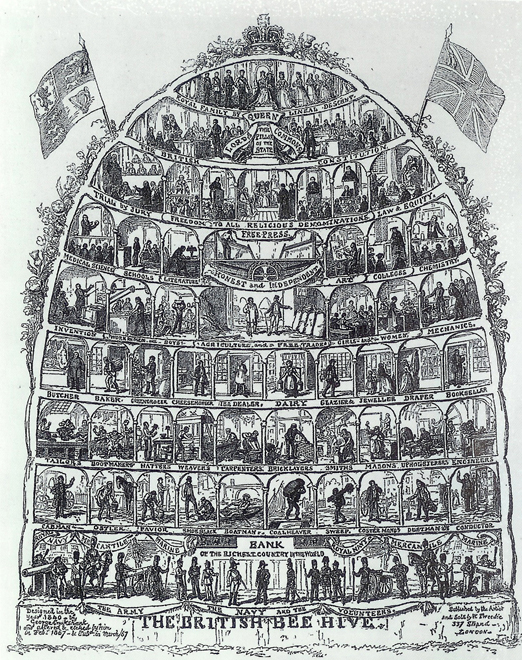
2. A Formal hierarchical structure
3b. Officials do not own their 'office'

|
"Clear your desk" means to take all your possessions away from your desk or
office because you have been told to leave your job (Cambridge
Dictionaries)
The word bureaucracy was created from bureau the French word for a writing
desk, such as one would find in an office, and ocracy meaning rule.
It is rule by people in an office.
|
Weber says
"The management of the modern office is based upon written
documents ('the
files'), which are preserved... There is, therefore, a staff of subaltern
officials and scribes of all sorts. The body of officials actively engaged
in a 'public' office, along with the respective apparatus of material
implements and the files, make up a 'bureau.' In private enterprise, 'the
bureau' is often called 'the office.'"
"
In principle, the modern organisation of the civil service separates the
bureau from the private domicile of the official, and, in general,
bureaucracy segregates official activity as something distinct from the
sphere, of private life
"
But it was not always like that. See
The London Clerk's Office of the Metrpolitan Commissioners in Lunacy 1828
4: Officials recruited on grounds of technical competence
6: Bureaucracy: Management by rules
A bureaucracy follows a consistent set of rules that
control the functions of the organisation. All decisions, rules and actions
are formulated and recorded in writing
"The theory of modern public administration ... assumes that the authority
to order certain matters by decree - which has been legally granted to
public authorities - does not entitle the bureau to regulate the matter by
commands given for each case, but only to regulate the matter abstractly."
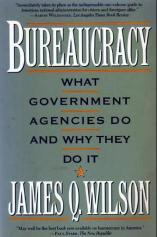
|
Technical Advantages of Bureaucratic Organisation
Bureaucracy's impersonal nature and the impartiality of its officials makes
it the most efficient form of organisation in modern society. Its spread is
inevitable and irreversible: once established it is virtually
indestructible.
In the 21st century Bureaucracy is associated with
inefficiency. But would
you want to take on the United States state machine descibed in
James
Wilson's book?
|
Max Weber said:
"The decisive reason for the advance of bureaucratic organisation has
always been its technical superiority over any other form of
organisation.precision, speed, unambiguity knowledge of the files,
continuity, discretion, unity, strict subordination, reduction of friction,
and of material and personal costs - these are raised to the optimum point
in the strictly bureaucratic administration..."
Bureaucracy, Capitalism and Democracy
As capitalism develops its promotes the spread of bureaucracy, which
threatens the basis of individuality, freedom, and democracy. Individuals
lose control over key aspects of their lives, and become dependent on
bureaucracy to satisfy their needs, from hospitals and schools, to public
utilities and banks.
Politicians become dependent on the technical knowledge and expertise of
officials to formulate and implement government policy. Democracy suffers
as a result: (i) citisens and their political representatives lose more and
more power; (ii) bureaucrats lack political vision, are cautious and averse
to risk taking.
A socialist society would be worse, according to Weber. It would entail one
unified state bureaucracy, where the 'dictatorship of the proletariat'
(workers) would be replaced by the dictatorship of the party/state
official. Capitalism was preferable because it left room for competing and
conflicting bureaucratic interests which might preserve vestiges of
individual freedom and initiative.
Weber feared bureaucratisation of politics would produce cautious leaders
without political vision, and subservient to bureaucratic interests, who
controlled the flow of information. He therefore favoured the rise of
charismatic leaders, directly elected by the people, to counteract the
bureaucratisation of the state and party machines.
|
Index and contents
Action
Interpretive Sociology
Weber
Sociology
Society
constructed
Life and works
Studied law
Studied economics
Breakdown followed by sociology
Some of his
works
Interpretive Sociology
Social Action
Ideal Types
Rational Instrumental Action
Rational Value Action
Affectual
Action
Traditional
Action
InterpretativeUnderstanding (Verstehen)
Is it Scientific?
Protestant Ethic and the Spirit of Capitalism
The Capitalist Spirit (Geist)
The Catholic Church and the Protestants
Weber starts by
saying
Modern Rational Capitalism
Benjamin Franklin quotes exemplify the (secular) spirit of Capitalism
The secular spirit of capitalism hasa religious origin
Modern Capitalism
Capitalism, Bureaucracy, Democracy, Power and
Domination
Ideal types for power - rule - and legitimate rule
Three ideal types of legitimate rule
Bureaucracy
|
 Time Line
Time Line
 Social Science Dictionary
Social Science Dictionary
 Durkheim and Weber's contrasting imaginations
Durkheim and Weber's contrasting imaginations
 Andrew Roberts' home page
Andrew Roberts' home page
 Society and Science home page
Society and Science home page
 Durkheim extracts
Durkheim extracts  Weber extracts
Weber extracts  Spencer extracts
Spencer extracts
 Richardson and Roberts on Bauman and May
Richardson and Roberts on Bauman and May  Richardson and Roberts on Durkheim
Richardson and Roberts on Durkheim






 Recommended starters
Recommended starters




















